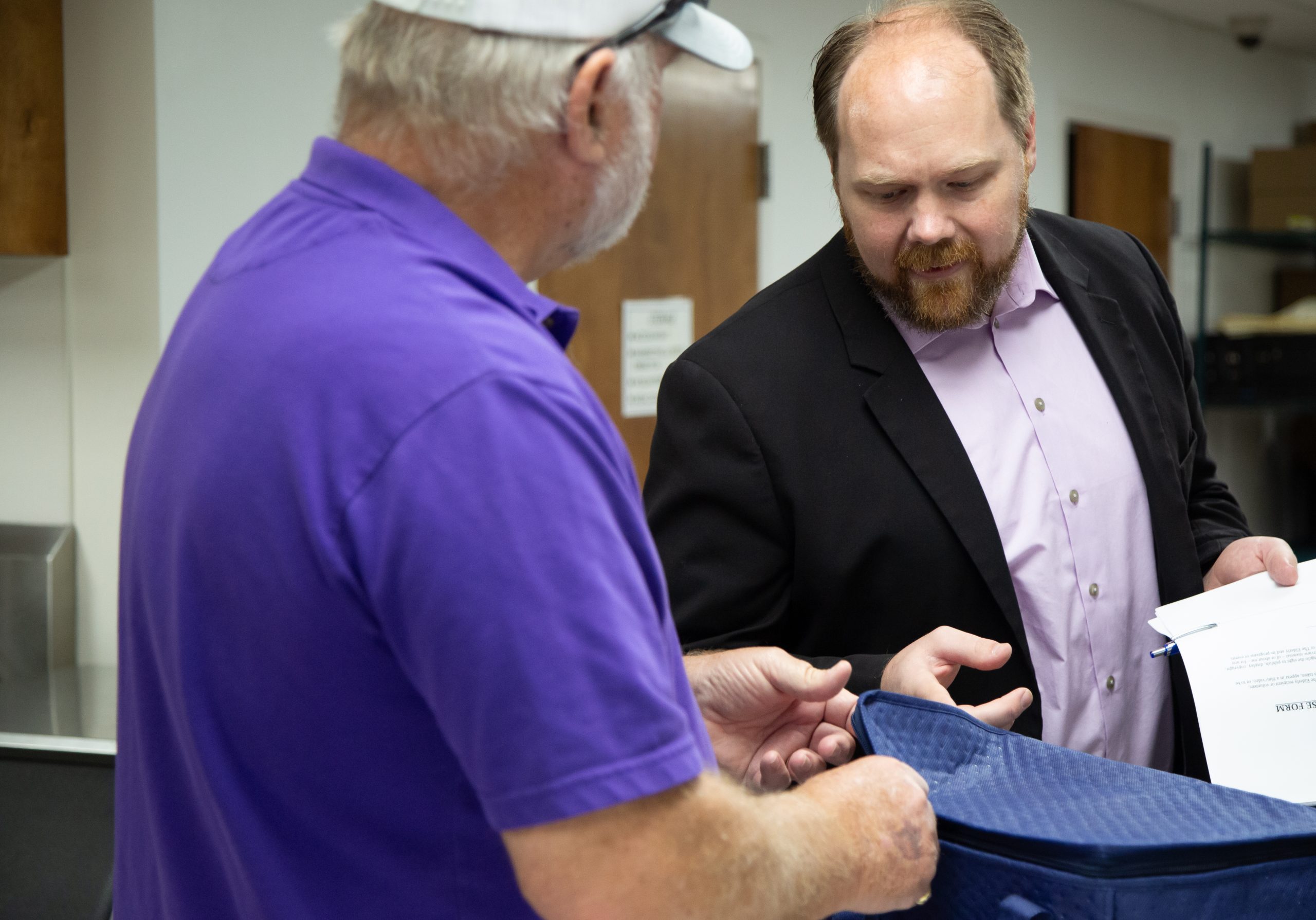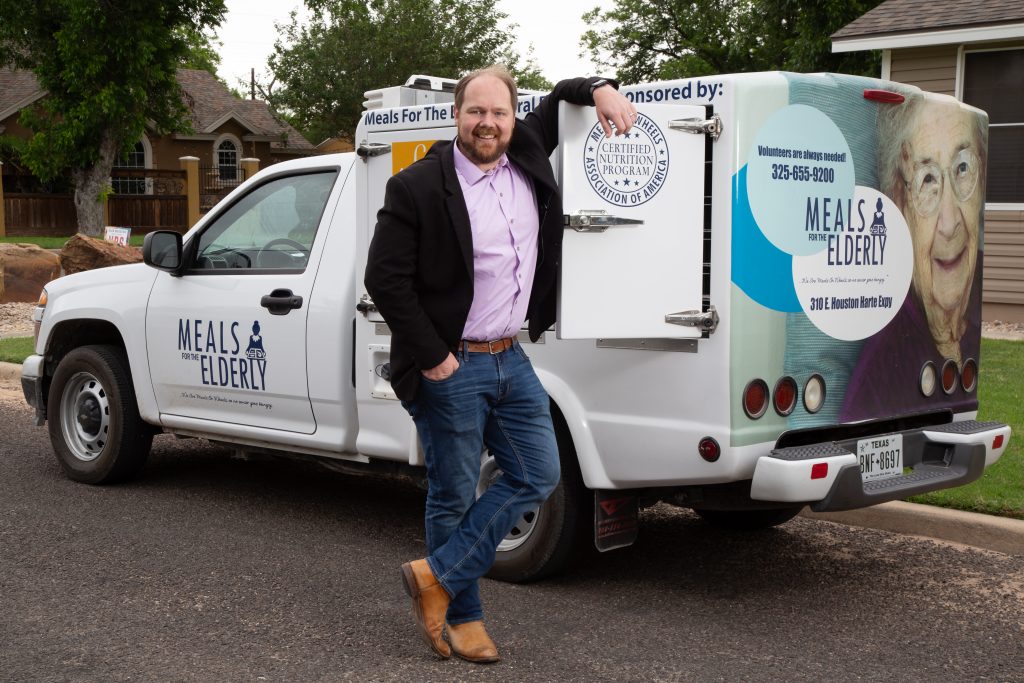Nourishing Community
Dason Tucker’s team brings hot meals and fellowship to the homebound.

Dason Tucker’s first delivery for Meals for the Elderly came before his 10th birthday. He’s now the nonprofit’s executive director. Photo by Joyce Marshall
Nourishing Community
Dason Tucker’s team brings hot meals and fellowship to the homebound.
One of the first times Dason Tucker ’11 delivered food for Meals for the Elderly in his hometown of San Angelo, Texas, he and his brother — then 9 and 6 years old — came face-to-face with a territorial rooster on a client’s lawn. “It took off after us,” he said. “It chased us out of the front yard.”
Despite the scary start, Tucker developed a love for serving others that never left him. Today, he is the executive director of the very same nonprofit, which delivers hot meals to the homebound.
Tucker’s family attended a small Disciples of Christ church every Sunday, and he went to church camps in the summers. His mother encouraged him to apply to TCU; its ties to the Disciples of Christ attracted him. As a bonus, his then-girlfriend, now wife, Marilyse Tucker ’13, was planning to attend.
He began his TCU career as a pre-med major, but a class prompted Tucker to focus instead on religion. “I loved my Introduction to American Religions class. It required so much independent thought,” he said. “Trying to piece things together and form your own opinions is what really, really stuck with me.”
Tucker said majoring in religion helped him develop the soft skills he uses every day to relate to different people. He was also involved with Disciples on Campus, a student organization.
A walk-on to the track & field team, Tucker also played club rugby and worked at the University Recreation Center. There, he got involved with the National Intramural-Recreational Sports Association. Leadership and programming experiences in the association later led him to pursue his master’s.
Despite growing up volunteering, nonprofit work was not part of Tucker’s initial career plan. But in 2013, a position as the director of aquatics, sports and family at the Dallas YMCA brought him back to the world of serving others.
Although Tucker said he sometimes felt like an “overqualified lifeguard” at the YMCA during his three years there, he made an impression on Eddie Dobbins, director of development. Dobbins saw Tucker’s work ethic and passion for community and said it was apparent that he “cares about others immensely.”
A job opportunity for his wife pulled the couple back to San Angelo, where Tucker worked as a graduate assistant while pursuing a graduate degree in coaching, sport, recreation and fitness administration at Angelo State University.
“I would teach first thing in the morning, take classes in the evening, and did that for about two years,” he said. “In that time, we also had our first and only daughter. She would actually go with me to class whenever I would teach, and I always had a line of freshmen begging to watch her during class.”
Tucker earned a reputation as a hardworking graduate student.
“There was never anything that he came in and halfway did. Dason seemed to always have a drive that went far beyond,” said Jordan Daniel, a kinesiology professor at Angelo State. “He wasn’t ever satisfied with just knowing what a thing was; he always wanted to know why, and how does it work with people. He was always considering the impact on the person.”
In 2020, as he was finishing his master’s, Tucker welcomed the opportunity to lead Meals for the Elderly as executive director.

Dason Tucker stands beside one of Meals for the Elderly’s delivery trucks. Tucker leads a team of 19 staff and 2,000 volunteers that serves over 1,100 individuals annually. Photo by Joyce Marshall
“It was a chance to come full circle,” he said. “This is the organization where everything started for me.”
At Meals for the Elderly, Tucker leads a team of 19 staff and a network of 2,000 volunteers. They serve clients in a sprawling area including Tom Green, Irion and Concho counties.
Seven kitchen staffers prepare more than 700 meals every day, which staff and volunteers deliver to people who are homebound and unable to prepare nutritious food for themselves. A good meal isn’t the only thing the nonprofit provides.
“If 2020 taught us anything, it’s truly what a big factor socialization is for the general public, especially for the elderly. We’re much more than just a meal because we’re providing socialization opportunities for our recipients,” Tucker said. “About 90 percent of those that we’re delivering to, that volunteer is the only person they’re going to see that day.”
Volunteers also provide a check-in that might otherwise never happen.
“We’ve got tons of volunteers that can tell you stories of how they went to deliver, and that recipient had fallen out of bed and had just been lying there on the floor because they couldn’t get to a phone to call for help,” Tucker said. “But they were comforted by the fact that they knew a volunteer was coming.”
The 3,500 square miles Meals for the Elderly covers is larger than the states of Delaware and Rhode Island combined.
“There are some days where we’re driving 45 minutes just to get to one location, one way,” Tucker said. “But that’s something that I’m probably the most proud of — being able to expand the services out to those that so desperately need it, because there’s no one else around.”
Since Tucker became executive director, the nonprofit has expanded to include more than 100 new recipients. Meals for the Elderly, which is funded by grants and donors, now serves over 1,100 individuals annually.
In November, the Texas Department of Agriculture selected Tucker to serve as the home-delivered meals representative on the Texas Food System Security and Resiliency Planning Council.
“None of this would be possible without the hard work and dedication of the staff and volunteers here. I’m extremely fortunate to be surrounded by individuals that truly buy in to what our organization does.”
Tucker shared some lessons he has learned from working for nonprofits:
Pause and reset. You have to learn where to take time appropriately, when to step away when you need it and how to prioritize. You need to find that healthy balance and know when to just take a breath.
Communicate with those above you. I had a supervisor [at TCU’s recreation center] that had an open-door policy where I could discuss things with him very bluntly, and I could get advice from him. I don’t think I would be able to have those skills today had I not had the opportunity there at TCU. Even in classes, being able to speak and have candid conversations with your professors translates pretty well into the work environment.
No isn’t always black and white. If you’ve got a major league batter who has a career batting average of, say, .350, there’s a good chance that’s going to be a Hall of Fame batter at the end of his career. But that still means he was hitting barely over a third of what was thrown at him. You have to take that approach. A lot of times when you’re working in the nonprofit world, you’re going to be told no more often than you’re told yes. The biggest transition I had was to not get hung up on those noes.
Fight off imposter syndrome. I have to fight this off myself some days, because I’m considered relatively young for executive director. Keep in mind that you’re there for a reason.

Your comments are welcome
Comments
Related reading:
Features
An Epic Comeback
Three decades ago, dedicated alumni led a drive to rebuild TCU’s left-behind athletics program.
Features
Building a Brand
Sportscaster Newy Scruggs mixes charisma with business acumen in a thriving on-camera career.
Alumni
Erin Dianis: How It Started … How It’s Going
The Fulbright award winner has found inspiration in teaching overseas.